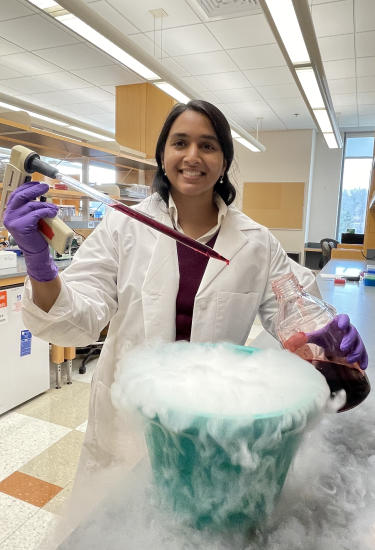Wednesday, April 07, 2021
|
 Meet Sabriya Syed. Sabriya is a native of Lexington, MA and a postdoc in the Imbalzano lab. In Kindergarten Sabriya wanted to be a firefighter, an idea that her mom shut down very quickly, instead encouraging her to be a pediatrician. Her interest in science started in high school when her neighbor, a scientist at MGH, invited Sabriya to her lab to do experiments and learn about lab research. Sabriya loves the outdoors and is aiming to visit one national park a year; so far she has been to Yellowstone, Acadia, Zion, Shenandoah, and several others throughout the country.
Meet Sabriya Syed. Sabriya is a native of Lexington, MA and a postdoc in the Imbalzano lab. In Kindergarten Sabriya wanted to be a firefighter, an idea that her mom shut down very quickly, instead encouraging her to be a pediatrician. Her interest in science started in high school when her neighbor, a scientist at MGH, invited Sabriya to her lab to do experiments and learn about lab research. Sabriya loves the outdoors and is aiming to visit one national park a year; so far she has been to Yellowstone, Acadia, Zion, Shenandoah, and several others throughout the country.
What set you on this trajectory of becoming a scientist?
I attended McGill University in Montreal. The science program was challenging but being able to experience Montreal made it worth it. After my undergraduate studies I went to work at Repligen in Waltham, MA where I worked in protein biochemistry and assay optimization and development. While working there, I realized that I wanted to pursue a PhD so after a year and half at Repligen, I started a PhD program at the Mayo Graduate School in Minnesota. I chose the Mayo Clinic in part because of the translational aspect to their research, and also because of the many resources available to trainees. My graduate studies lab worked on the role of epigenetic repressors in stem cell differentiation and I had the opportunity to learn and master next generation sequencing technologies.
Why did you choose this lab/department at UMass Chan?
I wanted to stay on the academic path, so I decided that a postdoc would be beneficial. Since I was interested in exploring how the epigenetic landscape relates to chromatin organization, having the opportunity to work in Tony’s lab while also receiving training from Job Dekker’s lab was appealing.
What does your lab study?
We study the chromatin remodeler Brg1 and its role in differentiation. My project is exploring how PRMT5 complexes with other factors to regulate the chromatin landscape, higher order chromatin structure and transcriptional activation by leveraging some of the techniques I learned in graduate school (i.e., Chip-seq), and combining them with new ones I learned at UMass Chan (i.e., Hi-C). I do a mixture of bench-work and bioinformatic analyses. This project has given me the opportunity to be independent, hone my informatics skills, and to self-teach many of the techniques and data analyses that I need to advance my research.
Where do you go from here?
I am starting the process of applying for faculty positions. My lab’s mission will be to understand the processes PRMT5 regulates through its chromatin binding during development. I will accomplish this using next generation sequencing (NGS) techniques and by modulating PRMT5 expression in-vivo and in in-vitro murine models of differentiation. I’m really enjoying formulating research goals for my future research career.
Any advice you wished you had gotten when you first started as a scientist?
Be independent-minded. I also wished someone had told me that the publication process is what you make of it and that it doesn’t have to be difficult, so take the leadership to formulate stories and publish.
What are some of the lessons you learned along the way that you would like to share with other trainees in the BMP department?
Work hard at building a strong network. Take initiatives for yourself. Motivate yourself to learn new things. Ask a lot of questions.
What do you want members of the BMP to know about you?
I usually walk around with my head down, but I am approachable 😀
Favorite Hobbies?
Traveling, skiing, biking, and hiking = slow walking in the woods.
One thing you would say to your younger self?
Don’t be nervous about going off the beaten path, it might be better for you in the long run.